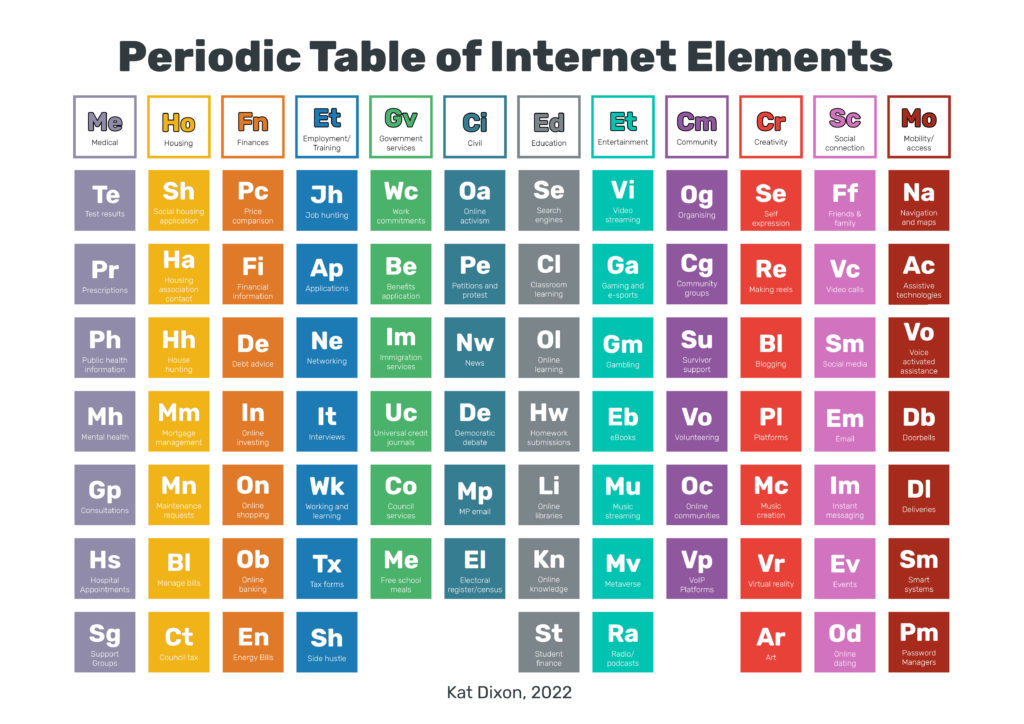A periodic table of internet elements
A free resource to show how internet access is elemental to daily living in the UK, produced by Kat Dixon
Scroll down to find a free resource; a Periodic Table of Internet Elements. I hope it resonates with you. It’s available for you to use in presentations, on social media, and to share with colleagues and friends. We’ve also produced the periodic table in text format.
When you do, please credit Kat Dixon and the Data Poverty Lab, and tag Good Things Foundation. If you have thoughts, do get in touch – we want to carry on the conversation.
The following blog is by Kat Dixon, a research fellow with the Data Poverty Lab. It provides context on where the table came from and why we think it’s important.
During my research fellowship with the Data Poverty Lab, I found myself struggling to explain what the internet – or lack of access to the internet – means.
I interviewed people who had struggled to get online. Over and over, I would hear similar phrases; the internet is “essential”; “it’s a human right”.
But how to express this? These statements felt true but also abstract. How could I communicate the actual day to day impact of poor internet access?
Talking with participants gave me glimpses of what poor internet access actually means. For their daily lives, it means:
- Running out of data whilst using Apple Maps to navigate to a job interview.
- Going to the library to fill in a housing application form with people standing behind them, tapping their feet.
- Walking every day to a public WiFi spot to fill out Universal Credit journals, fearful they weren’t going to get that payment to buy food this week.
- Going to friends’ houses to use the WiFi to check job listings.
- Finally having data on their phone so they could video call their Community Psychiatric Nurse.
- Waiting until 11pm at night to submit their homework, because that’s when the connection worked.
The online world is the offline world. If you don’t have access to the internet in the UK, you are denied access to essential services. Dave* said it well; “The world works online, doesn’t it now. Everything from getting your prescription to paying your council tax.”
And whether we’re talking about housing or healthcare, banking or benefits, if you can’t get online, you can’t get what you need to live.
Ji* summarised it perfectly; “It’s like everybody’s third arm now isn’t it, the internet. And if you’ve lost that third arm, what do you do?”
A community worker expressed how difficult it is to live independently or with dignity without internet access. “To be independent, to be able to look after yourself. How can you look after yourself without all the information and you can’t get access to it?”
The online world is the offline world. If you don’t have access to the internet in the UK, you are denied access to essential services.
Pat* an older man seeking work told me simply about the internet “I can’t function without it.” Les*, a young lad from Hartlepool struggling with mental illness said, “it brings me and my family together, being able to speak to them.”
But how to express this? I wanted to explain how lack of good access affects so many different elements of people lives, that it’s a constant barrier to fundamental needs.
I also wanted to draw out how much more important access is if you’re disabled, ill, have a learning disability, neurodivergent, older, experiencing mental ill health or fleeing domestic violence. That for some people using the internet to have a grocery shop delivered or being able to talk to a friend when you can’t leave your home is not a nice to have, it’s absolutely vital.
This table is an attempt to communicate that good internet access is elemental to living life in the UK. Each header element summarises a domain – or an area of use – and underneath are example elements to illustrate how this might play out in someone’s life.
Some elements you will probably recognise from your own life such as online shopping, email, messaging friends, maps.
Some elements attempt to highlight unseen difficulties by people who are more likely to be affected by data poverty; social housing contact, job applications, universal credit journals, health and social care contacts, mental health support.
Some elements are undervalued. Digital inclusion often focuses on functional, essential needs with clear economic impacts, such as how the internet enables work and education. What’s just as important is how online access facilitates connection, creativity, self expression and civic participation. These elements are deliberately given equal weight.
The table is not exhaustive and it’s not attempting to be. The internet is used for a vast array of needs, desires and self-expression, and it is constantly changing. The elements interact and are not easily separated; YouTube videos can be educational, entertaining and a way to connect with friends.
What I hope the table illustrates is that internet access is elemental to daily living, and by not enabling good access to this world, some people are being left behind.
There are over 2 million households struggling to pay broadband and mobile bills in the UK, and 6% of adults in England don’t have internet at home.
My hope is that people engaged in the digital inclusion debate will recognise the table and use it to illustrate need, and that people less familiar with data poverty will see its depth and urgency.
Internet access is elemental; please use this graphic to share this idea.
*names have been changed

- Test results
- Prescriptions
- Public health information
- Mental health
- GP consultations
- Hospital appointments
- Support groups
- Social housing application
- Housing association contact
- House hunting
- Mortgage management
- Maintenance requests
- Manage bills
- Council tax
- Price comparison
- Financial information
- Debt advice
- Online investing
- Online shopping
- Online banking
- Energy bills
- Job hunting
- Applications
- Networking
- Interviews
- Working and learning
- Tax forms
- Side hustle
- Work commitments
- Benefits application
- Immigration services
- Universal Credit journals
- Council services
- Free school meals
- Online activism
- Petitions and protest
- News
- Democratic debate
- MP emails
- Electoral register/census
- Search engines
- Classroom learning
- Online learning
- Homework submissions
- Online libraries
- Online knowledge
- Student finance
- Video streaming
- Gaming and e-sports
- Gambling
- eBooks
- Music streaming
- Metaverse
- Radio/podcasts
- Organising
- Community groups
- Survivor support
- Volunteering
- Online communities
- Voice over internet protocol (VoIP) platforms
- Self expression
- Making reels
- Blogging
- Platforms
- Music creation
- Virtual reality
- Art
- Friends and family
- Video calls
- Social media
- Instant messaging
- Events
- Online dating
- Navigation and maps
- Assistive technologies
- Voice activated assistance
- Doorbells
- Deliveries
- Smart systems
- Password managers

Kat Dixon
Data Poverty Lab Fellow
Kat Dixon is a digital inclusion advocate and one of our Data Poverty Lab Fellows, exploring community-led solutions to data poverty. Kat is Director of Partnerships at national charity Catch22 and has built digital skills and inclusion programmes with TikTok, Microsoft, Salesforce, Raspberry Pi and more. She champions inclusive co-design, the power of public-private partnerships and the transformative possibility of digital access. Kat previously scaled international healthcare innovations in the UK.
